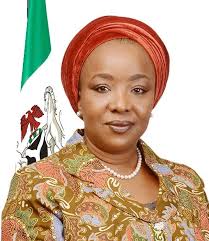News
PTAD lauds Impact of Technology in Pension Verification

Mrs Sharon Ikeazor, Executive Secretary, Pension Transitional Arrangement Directorate (PTAD) says the deployment of technology has made pension verification seamless.
Few years ago, when PTAD was still doing manual verification of retirees many of them were dying in the process.
PTAD deployed 45 functional laptops, 20 scanners, 20 webcam cameras, 20 thumb-print capturing machines and five printers.
Ikeazor made this known to newsmen when he officially declared open the verification NITEL and MTEL pensioners in Enugu on Wednesday.
She said the directorate was fully automated, adding that PTAD staff had been well-schooled and vast on how to operate the new devices.
“As I speak to you, we have our internet server here and all its necessary attachment to ensure seamless exercise and to key- in information instantly.
“The directorate had over the years invested heavily on modern technology that will make our work and service to the people very seamless and real-time,’’ she said.
The executive secretary said that through the help of technology PTAD was now doing mobile verification for sick and incapacitated pensioners.
“We have collected the phone numbers of sick pensioners and their contacts; and our staff will do mobile verification for them by going to where they are to capture them electronically,’’ she said.
Sharing his experience, one of the pensioners, Mr Emeka Offor said that it only took him less than 10 minutes for his name and vital information; his picture and thumb-print captured and scanning of his document to be captured.
“I must commend President Muhammadu Buhari for his care for pensioners and equipping PTAD with modern gadgets to function optimally,’’ he said.
PTAD is verifying 22,000 pensioners of NITEL and MTEL in seven centres across the nationwide and at each of the centre, it will take eight days to conduct the exercise.
News
PalmPay Launches CSR Initiatives to Empower Women, Foster Financial Literacy in Northern Nigeria

In a strategic move to expand financial inclusion in Nigeria, leading mobile banking platform, PalmPay has launched a series of CSR programs across Kano and Kaduna. The CSR initiative named “Passing the Baton” represents the brand’s commitment to passing on knowledge and providing the resources individuals and businesses need to achieve financial independence and drive economic empowerment.

This initiative is a bold move by PalmPay to bridge the opportunity gap in the North by providing financial literacy training and micro-business branding support to 5,000 women-owned businesses in Kano and Kaduna. This strategic initiative reaffirms PalmPay’s commitment to inclusive development and economic empowerment, particularly in underserved regions.
“At PalmPay, we believe that real financial inclusion must be far reaching and cover the grassroots,” said Chika Nwosu, Managing Director of PalmPay. “Our new CSR program is focused on supporting gender equity by equipping women with the knowledge, tools, and visibility they need to thrive as entrepreneurs in their communities.”
Through this initiative, beneficiaries will receive free health insurance, hands-on training workshops, enhanced store branding to boost visibility, and branded merchandise to strengthen their business presence.
The initiative is part of PalmPay’s broader strategy to extend its innovative solutions, expand its footprint in Northern Nigeria, while building sustainable partnerships with local stakeholders for long-term impact.
In a show of support, His Royal Highness, the Emir of Kano, Dr. Muhammadu Sanusi II, has endorsed the initiative, calling on other stakeholders to join forces with PalmPay in ensuring the North benefits fully from the growing digital economy. PalmPay has received commendation from community stakeholders, as the initiative aims to serve as a model for similar projects across other northern states.
As PalmPay continues to scale across Nigeria, the company remains committed to bridging the financial inclusion gap and empowering underserved groups, particularly women and youth, through its innovative solutions and impact initiatives.
News
EFCC Witness Admits Writing Off Arik Air’s $2.3M Debt Amid N76Bn Fraud Trial


News
Anambra Shines in 2025 E-Governance Rankings, Setting National Standards

Anambra State has once again demonstrated its leadership in digital transformation, emerging as one of Nigeria’s top three states in the 2025 e-Governance Report published by the Panorama CIAPS Governance Performance Index (CGPI).

According to the report — a collaborative effort between Nigerian Panorama and the Commonwealth Institute of Advanced Professional Studies (CIAPS) — Anambra ranks alongside Lagos and Enugu as the leading states in adopting and implementing e-governance practices that foster accountability, transparency, and improved service delivery.
In his remarks, Professor Anthony Kila, Director of CIAPS, emphasized the importance of e-governance in shaping how governments interact with citizens. “The centrality of e-governance allows us to assess the performance of state governments in the country. How the government treats the digital world says a lot about them,” he said.
The report evaluated states based on a comprehensive set of criteria, including website security, up-to-date content, public engagement, availability of online services, policy updates, and user accessibility. Anambra’s performance reflects the state’s deliberate investment in digital infrastructure and its commitment to leveraging technology as a tool for inclusive governance.
Reacting to the recognition, the Managing Director/CEO of the Anambra State ICT Agency, Chukwuemeka Fred Agbata, CFA, described the report as a welcome validation of the efforts being made under the leadership of Prof. Charles Chukwuma Soludo, CFR, to reposition Anambra as a liveable and prosperous smart mega-city.
“This is not just about being tech-savvy,” Agbata said. “It’s about using digital tools to create real impact — making the government more accessible, responsive, and transparent. Anambra is building a digital future that works for everyone.”
The CGPI Report recommended that all states intensify efforts to train public servants, maintain digital platforms effectively, and build user-friendly systems that keep citizens informed and empowered. For Anambra, this recognition serves both as a milestone and a motivation to scale new heights.
As the journey continues, Anambra remains focused on setting the pace for e-governance in Nigeria in line with the Governor’s mantra of Everything Technology & Technology Everywhere.

 E-Financial3 days ago
E-Financial3 days agoFidelity Bank Plc Wins 2025 DBN Innovation Award for MSME Support

 E-Business3 days ago
E-Business3 days agoNigeria Among Hotspots as Kaspersky Warns of Rising Ransomware Threat in Africa

 Telecom2 days ago
Telecom2 days agoMTN Nigeria Invests ₦900Bn in 2025 to Boost Network Quality in Lagos & Abuja

 E-Business3 days ago
E-Business3 days agoNDPC Probes Suspected Data Breach in Examination Centres

 Telecom3 days ago
Telecom3 days agoVitel Wireless Completes Interconnectivity with all Major Telcos in Nigeria

 Telecom3 days ago
Telecom3 days agoMTN inducted into Brand Africa Hall of Fame

 Telecom3 days ago
Telecom3 days agoeBusiness Life Girls In ICT: Stakeholders Call For More Action On Girls Participation In ICT

 General News3 days ago
General News3 days agoNigeria Approves $500m for AfDB’s Trust Fund Replenishment over Next 15 Years


























